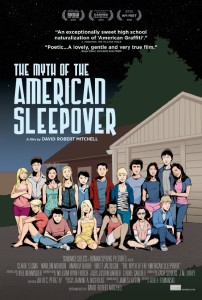
| Release Date: | August 5th, 2011 at the Main Art Theatre in Royal Oak, Michigan and in limited release across the country |
| Starring: | Claire Sloma, Marlon Morton, Amanda Bauer, Nikita Ramsey, Jade Ramsey, Brett Jacobsen |
| User Rating: | |
| Writer: | David Robert Mitchell |
| MPAA Rating: | PG-13 |
| Director: | David Robert Mitchell |
Billed as a coming of age film, The Myth of the American Sleepover by first time writer/director David Robert Mitchell shows some promise with a script that almost captures an understanding of a time most of us will fondly remember but doesn’t do so with enough imagination and emotion to get us to buy into what he is selling: a loss of teenage innocence. The film opens as Maggie (Claire Sloma) laments about the end of summer and which we assume has been less than thrilling to this just reaching puberty middle school girl ready to become a high school freshman. In the character Maggie is the common thread that pulls the movie together, but unfortunately, although some of the acting is above grade, the ensemble cast just doesn’t do well enough to pull this movie into the emotionally charged arena a coming of age movie need to be to be able to preach a message.

As the film works it’s way through a plot filled with teenage angst, anticipation, disappointment, and, unfortunately, a lack of emotion, what we are left with is a film that never quite reaches its bountiful potential. The plot line for this story promised a movie that was set against a backdrop of mile roads, neighborhood blocks, abandoned factories, and lakes which make up Metro Detroit. The story follows four young people as they search for love and adventure on the last night of summer. Had the notes for the film been followed, and I promise there is very little in the film that leads us to believe that what I just wrote is correct, maybe we would’ve had a film that was worth investing in, but what we get from Mitchell’s The Myth of the American Sleepover is instead, a very inconsistent plot line.
I’ll admit that although the film is not filled with a long list of inaccuracy, it’s also not filled with a long list of things to like about it. Some coming-of-age films, like 16 Candles, also leave you with a soundtrack that you will leave the theater humming. This movie provides no such opportunity. In fact, the soundtrack which should be part of what helps target you emotionally is not only forgettable but as I’m sitting here writing this I’m trying to remember is if there were any songs that I found to be remarkable, or recognizable. There weren’t. Sadly, the audience is left to just assume that this is modern-day America, not necessarily because of the soundtrack, or by reference made in the actual film, but by using our own devices, which is fine I guess.
As always, when I go to the theater I’m looking to be entertained and when I know I’m seeing a coming-of-age film I look to be pulled in a certain direction and I can assure you that that tugging or pulling never happens here. With the exception of Claire Sloma, the rest of the cast is both unremarkable and in some cases miscast but I beat this film up enough for now so I’ll let it go. Chances are if you subscribe to the IFC film package on your cable outlet you’ll get to see The Myth of the American Sleepover soon enough and I would suggest you save your money for your cable bill instead of rushing to the theater to see a film that I couldn’t find much about it to like. Of course, I always have my memories of that time in my life when I myself came-of-age, and I assure you they were much better than David Robert Mitchell’s film.[box_info]WHERE TO WATCH (powered by JustWatch)
[/box_info]


